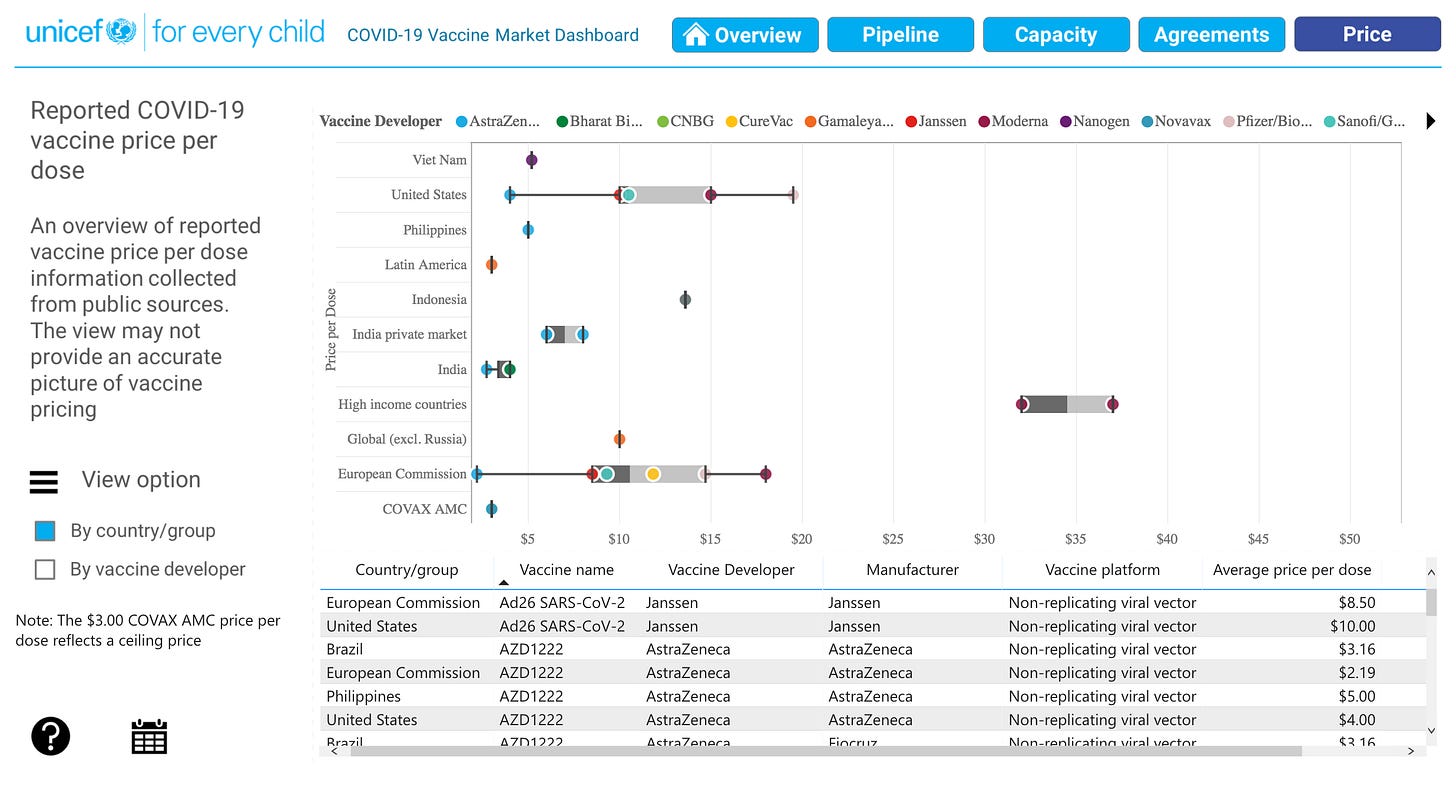Contracts, Data and Investigations: Edition 2021-01-15
This week’s content: Tracking COVID-19 vaccine prices, vaccine distribution in Argentina, ventilators in the US, COVID-19 funding response, and overpriced 3D models of Kazakhstan sacred places
This newsletter gathers stories covering the use and abuse of government contracts during the COVID-19 pandemic and beyond. Share your stories and investigations with us. We’d love to read and feature them. And we’d appreciate a like if you enjoyed the read.
In 2021, procurement has one job: get everyone their jab. Vaccine procurement is a matter of health, recovery, but most of all, of inclusion. When prices are not routinely published, companies have the power to dictate the terms. No country will want to be left out of the deal. Only an open and transparent process can guarantee a fair deal for every country, and enable collaboration to reach a solution for a global problem.
Some information on vaccine dose prices is available through UNICEF’s COVID-19 Vaccine Market Dashboard that pulls together information from secondary sources.
No mobile phones. 45 minutes to review the 60-page contract. European parliamentarians were able to get a first look at the vaccine contract between the EU and Curevac. In addition, critical information was blacked out, including quarter-yearly delivery amounts and prices, writes Markus Becker for DER SPIEGEL. While the EU countries were successful in securing better terms and prices by procuring collectively, they seem to have ordered comparatively less of the expensive BioNTech vaccine that was the first in being approved and available, delaying the vaccination drive, the Economist analyzes.
Securing efficient and safe distribution is one of the key challenges for the vaccine, from delivery to storage.
In Argentina, a logistics company provided the distribution of the first 300,000 doses of vaccines for free, only to win a large contract without competition later, writes Romina Colman and Maia Jastreblansky for La Nación.
Rwanda has purchased five new freezers that can cool at -80°C worth RWF 50 million (USD 50,000) to prepare for the arrival of the vaccine in March.
Beyond the vaccines – pandemic emergency contracting pandemonium continues.
In the US, the Washington Post’s Reed Albergotti and Aaron Gregg report on a $70 million contract for ventilators unfit for treating COVID-19 patients. The contract went to a company that had only just escaped bankruptcy six months earlier.
Devex has been collecting information on the COVID-19 funding response with weekly updates. Lisa Cornish provides a summary of the priorities that emerged after a year of COVID funding – and how announcements of funding have been implemented. She finds that governments as the major funder are the hardest to track. Of more than $12 trillion in investments that were announced, just $10 billion can be tracked through programs, $2 billion in grants, $356 million in tenders, and $190 million in awarded contracts.
Nothing is sacred: In Kazakhstan, the National Museum of Kazakhstan has spent almost three billion tenge building 3D models of the country's sacred places, such as mausoleums and memorial complexes. Much of the work has been overpriced and done through subcontractors. Chingiz Ualikhan, Dmitry Khegai, and Pavel Bannikov of Factcheck have the story.
A new platform to monitor risks in public procurement has been launched in Chile by Observatorio Fiscal and Espacio Público (with support by Open Contracting Partnership). The red flagging tool at https://redflags.observatoriofiscal.cl provides every procurement process and procuring agency with a risk rating using indicators including competition and transparency.
For our recommendations, resources and tools, check our COVID-19 resource page. Our friends at the GIJN have pulled together some tips and tricks for investigating public procurement. This newsletter has been put together by the Open Contracting Partnership. Comments? Suggestions? Got a story you’ve written to share? Write to Georg at gneumann@open-contracting.org. Thanks for reading.
Did a friend forward you this email? Click here to subscribe.




